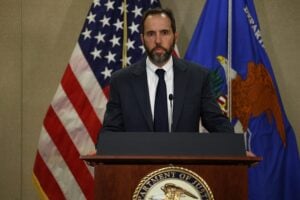
(Photo by Tom Brenner for The Washington Post via Getty Images)
On Tuesday, Chief Justice John Roberts gave Special Counsel Jack Smith eight days to respond to Donald Trump’s application for a stay in the election interference case. In the event, it took the prosecutor just two days to turn in his homework.
Unsurprisingly, the government would not like the Court to grant Trump’s request to chew clock with a doomed attempt to get en banc review at the DC Circuit, followed by a leisurely several weeks briefing the application for stay, and then finally a gentle progression to a fully briefed petition for certiorari.
“Delay in the resolution of these charges threatens to frustrate the public interest in a speedy and fair verdict — a compelling interest in every criminal case and one that has unique national importance here, as it involves federal criminal charges against a former President for alleged criminal efforts to overturn the results of the Presidential election, including through the use of official power,” writes Michael Dreeben, one of the most experienced appellate lawyers in the country and named counsel of record on the response.
Unlike Trump’s lawyers, Dreeben did not open with a Yogi Berra quote. Instead, he spent most of his time on string cites and the actual legal standard for a stay. He also had a decent riposte to the charge that the special counsel took the position in his rejected petition for certiorari before judgment that “it is of imperative public importance that respondent’s claims of immunity be resolved by this Court.”
“To the extent that this denial reflected an inclination not to review applicant’s claim of absolute immunity from federal criminal prosecution, the Court should likewise deny this application and any forthcoming petition — especially now that the court of appeals has unanimously affirmed the denial of immunity in a thorough opinion that correctly rejects applicant’s arguments,” he argued.
In his application, Trump warned of a flood of criminal prosecutions for official acts if his magical perpetual immunity claims were not upheld. Dreeben rubbished that prediction, noting that no one has ever operated under the assumption that presidents enjoyed total immunity for their official acts — that’s why Ford offered that pardon, and Nixon took it. It’s why Independent Counsel Lawrence Walsh investigated Ronald Reagan for his role in the Iran/Contra affair, writing that “a President, and certainly a past President, is subject to prosecution in appropriate cases,” but ultimately concluding that “President Reagan’s conduct fell well short of criminality which could be successfully prosecuted.” And it’s why Judge Randolph Moss, then an assistant AG, wrote in a 2000 OLC memo that Bill Clinton was amenable to prosecution once out of office.
If no prior president was ever prosecuted, clearly it wasn’t because such a prosecution was deemed unconstitutional. Maybe it was because no prior president engaged in quite so much rampant criminality!
Similarly, the government’s response takes apart Trump’s attempt to extrapolate a get-out-of-jail-free card for criminal acts from presidential immunity from civil suits. While any weirdo with $402 and a printer can file a lawsuit, a criminal indictment requires a prosecutor and a grand jury and a judge.
“Applicant provides no basis for believing that Attorneys General — members of the Executive Branch themselves — would permit groundless prosecutions of former Presidents that would damage the Presidency as an institution,” the prosecution argues. “To the contrary, Attorneys General have every incentive to protect that institution.”
As for Trump’s farfetched arguments that the Impeachment Judgment Clause means that an official who is impeached by the House but acquitted by the Senate can never be prosecuted, the response briefly notes that several federal judges have been prosecuted after Senate acquittal. (Although, if Trump’s theory is correct, Speaker Mike Johnson just conferred lifetime immunity on Secretary Alejandro Mayorkas.)
If the justices choose not to let the circuit court’s order stand and issue the mandate to the trial judge, then the special counsel urges them to treat Trump’s application for stay as a petition for certiorari and grant expedited review, hearing the case in March.
Should make for a fun Friday conference at 1 First Street.
Trump v. US [SCOTUS Docket]
US v. Trump [District Docket via Court Listener]
US v. Trump [Circuit Docket via Court Listener]
Liz Dye lives in Baltimore where she produces the Law and Chaos substack and podcast.

